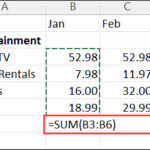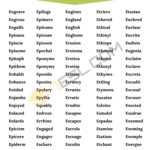Verbs That Start With E
1. Earn
2. Edit
3. Educate
4. Embark
5. Embarrass
6. Embrace
7. Empathize
8. Employ
9. Empower
10. Encourage
11. Endanger
12. Enforce
13. Engage
14. Enhance
15. Enlarge
16. Enlighten
17. Entertain
18. Establish
19. Evaluate
20. Examine
21. Exceed
22. Excel
23. Exchange
24. Execute
25. Exercise
26. Exhilarate
27. Expand
28. Expect
29. Exploit
30. Explore
More About Verbs That Start With E
Welcome to our language blog, where we explore the beautiful intricacies of the English language. Today, we dive deep into the realm of verbs that begin with the letter “E.” English is a language that offers an extensive range of verbs, each holding its own unique meaning and usage.
Verbs are the engines that drive our sentences, transforming mere words into actions, states, or concepts. They provide movement and life to our language, enabling us to communicate effectively and express our thoughts and emotions. With verbs that start with the letter “E,” we embark on a linguistic journey, unraveling the richness and versatility of this specific group of verbs.
When we think of verbs that begin with “E,” our minds instantly drift towards action and motion. From “explore” to “excel,” these words carry a sense of adventure, progress, and achievement. Whether we are exploring new territories, excelling in academics, or engaging in physical activities, these verbs stimulate our senses, igniting a desire for growth and achievement.
But verbs starting with “E” are not solely confined to physical movements. They also capture a range of mental and emotional states. For instance, the verb “enlighten” conjures images of gaining knowledge and insight, while “empower” signifies the act of granting strength and confidence to oneself or others. Within these verbs, we discover the power of words to influence and shape our inner selves and the world around us.
Furthermore, verbs that begin with “E” allow us to articulate our experiences, summoning imagery and emotions with just a single word. Think of the verb “enchant” it transports us to a realm of magic and wonder, capturing the essence of something truly captivating. Similarly, “evoke” envelopes us in nostalgia, reminding us of cherished memories and moments.
Let us not forget the verbs that denote habitual or ongoing actions. Verbs such as “exercise,” “eat,” or “engage” are part of our daily routines, holding immense significance in our lives. They remind us of the importance of active participation and self-care, urging us to nourish our bodies and minds and engage with the world around us.
Moreover, verbs starting with “E” offer endless opportunities to describe relationships and interactions. Consider the verb “embrace” it conveys warmth, acceptance, and connection. Meanwhile, “educate” exemplifies the transmission of knowledge and wisdom, emphasizing the role of teaching and learning in our society.
As we delve into the world of verbs beginning with “E,” we also encounter words that are less commonly used but equally fascinating. “Exhilarate” immediately sparks our curiosity, evoking a sense of intense excitement and happiness. On the other hand, “expectorate” stands as a reminder of the diverse range of verbs present within the English language, as it refers to the act of coughing up phlegm.
In this exploration of verbs starting with “E,” we embark on a journey of personal growth, self-expression, and connection with others. Through these words, we are reminded of the power we hold as language users to shape reality, communicate our thoughts and emotions, and make a meaningful impact on the world.
Stay tuned as we delve deeper into each of these verbs, unraveling their meanings, contexts, and nuances. Together, we will discover the endless possibilities and versatility offered by verbs that start with “E.” Get ready to embark on a linguistic adventure that will expand your vocabulary and broaden your understanding of the English language.
Verbs That Start With E FAQs:
1. FAQ: What is the verb “experience” mean?
Answer: The verb “experience” refers to the act or process of encountering or undergoing something.
2. FAQ: How can I effectively “educate” myself on a particular topic?
Answer: To “educate” oneself, you can engage in self-study, utilize online resources, attend relevant courses, or seek guidance from knowledgeable individuals.
3. FAQ: What does it mean to “evaluate” something?
Answer: To “evaluate” means to assess or judge the quality, value, or significance of something based on specific criteria.
4. FAQ: How can I “evolve” in my personal or professional life?
Answer: To “evolve” means to develop or change over time. You can do so by embracing continuous learning, adapting to new circumstances, and seeking personal growth opportunities.
5. FAQ: What does it mean to “empower” someone?
Answer: “Empower” refers to giving someone the authority, confidence, or control to do something independently or make decisions on their own.
6. FAQ: Which actions classify as a “violation”?
Answer: Any action that breaks a rule, law, or agreement is considered a “violation.” It can refer to various situations, such as breaching a contract, disobeying regulations, or trespassing.
7. FAQ: What does the term “elicit” mean?
Answer: To “elicit” means to draw out, evoke, or obtain a response, information, or reaction from someone through questioning, stimulation, or other means.
8. FAQ: How can I effectively “execute” a plan or project?
Answer: To “execute” a plan or project efficiently, you need to carefully plan the steps, allocate resources, delegate tasks, and oversee the implementation process.
9. FAQ: What does it mean to “eliminate” something?
Answer: To “eliminate” means to remove, eradicate, or get rid of something entirely, often by reducing it to zero or neutralizing its impact.
10. FAQ: How can I “encourage” others to perform better?
Answer: To “encourage” others, you can provide motivation, support, and positive feedback, set achievable goals, and create a nurturing environment for growth and development.
















